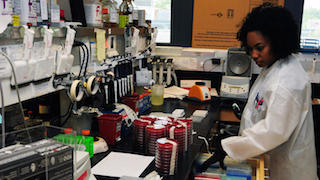A 'Slow Catastrophe' Unfolds as the Golden Age of Antibiotics Comes to an End
In early April, experts at a military lab outside Washington intensified their search for evidence that a dangerous new biological threat had penetrated the nation’s borders. They didn’t have to hunt long before they found it. On May 18, a team working at the Walter Reed Army Institute of Research here had its first look at a sample of the bacterium Escherichia coli, taken from a 49-year-old woman in Pennsylvania. She had a urinary tract infection with a disconcerting knack for surviving the assaults of antibiotic medications. Her sample was one of six from across the country delivered to the lab of microbiologist Patrick McGann.
 Research scientist Rosslyn Mayback was part of the team that identified a strain of E. coli bacteria with a gene that could spread antibiotic resistance. (Walter Reed Army Institute of Research)Within hours, a preliminary analysis deepened concern at the lab. Over the next several days, more sophisticated genetic sleuthing confirmed McGann’s worst fears. There, in the bacterium’s DNA, was a gene dubbed mcr-1. Its presence made the pathogen impervious to the venerable antibiotic colistin. More ominously, the gene’s presence on a plasmid — a tiny mobile loop of DNA that can be readily snapped off and attached to other bacteria — suggested that it could readily jump to other E. coli bacteria, or to entirely different forms of disease-causing organisms. That would make them impervious to colistin as well.
Research scientist Rosslyn Mayback was part of the team that identified a strain of E. coli bacteria with a gene that could spread antibiotic resistance. (Walter Reed Army Institute of Research)Within hours, a preliminary analysis deepened concern at the lab. Over the next several days, more sophisticated genetic sleuthing confirmed McGann’s worst fears. There, in the bacterium’s DNA, was a gene dubbed mcr-1. Its presence made the pathogen impervious to the venerable antibiotic colistin. More ominously, the gene’s presence on a plasmid — a tiny mobile loop of DNA that can be readily snapped off and attached to other bacteria — suggested that it could readily jump to other E. coli bacteria, or to entirely different forms of disease-causing organisms. That would make them impervious to colistin as well.
It was a milestone public health officials have been anticipating for years. In a steady march, disease-causing microbes have evolved ways to evade the bulwark of medications used to treat bacterial infections. For a variety of those illnesses, only colistin continued to work every time. Now this last line of defense had been breached as well. A second U.S. case of E. coli with the mcr-1 resistance gene was reported this week in the journal Antimicrobial Agents and Chemotherapy. Researchers are still working to determine whether it, or any of 18 other samples from around the world, contained the gene on an easy-to-spread plasmid...
- Tags:
- Alexander Fleming
- Anthony Fauci
- antibiotic resistance
- Antibiotics
- Antimicrobial Agents and Chemotherapy
- ceftriaxone
- Center for Medicine in the Public Interest
- Centers for Disease Control and Prevention (CDC)
- Colistin
- Defense Department’s Multidrug-resistant Organism Repository and Surveillance Network
- drug-resistant tuberculosis
- E. coli bacteria
- Ebola
- Emil Lesho
- Food and Drug Administration (FDA)
- Infectious Diseases Society of America
- Klebsiella
- mcr-1 gene
- Melissa Healy
- National Institute for Allergies and Infectious Diseases (NIAID)
- Patrick McGann
- penicillin
- Peter Pitts
- public health
- Rosslyn Mayback
- salmonella
- Susan Bleasdale
- University of Illinois in Chicago
- Walter Reed Army Institute of Research
- William P. Hanage
- World Health Organization (WHO)
- Zika
- Login to post comments